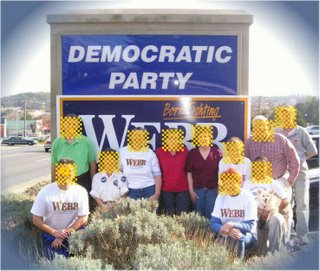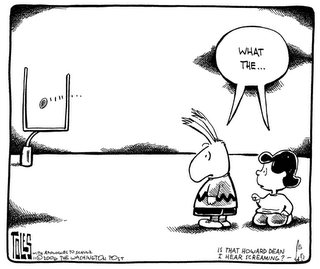Shut it down.
 Five years ago this weekend, I took part in the annual protest against the School of the Americas at Ft. Benning in Columbus, Georgia. It was a moving experience in many ways -- a reunion of sorts, and strengthening to be in the company of peacemakers in the war atmosphere after the September 11 attacks. Almost nine thousand people participated, more than the organizers had hoped for under the circumstances.
Five years ago this weekend, I took part in the annual protest against the School of the Americas at Ft. Benning in Columbus, Georgia. It was a moving experience in many ways -- a reunion of sorts, and strengthening to be in the company of peacemakers in the war atmosphere after the September 11 attacks. Almost nine thousand people participated, more than the organizers had hoped for under the circumstances.The local authorities, seizing on the national mood to identify anything dissident with terror and bottle it up, decreed that the usual Saturday speeches and music in the park would have to take place instead inside a baseball stadium miles from the base, where we were guarded by hundreds of police, who checked bags of everyone entering. Many of the cops had done SOA demo duty before, but usually at the perimeter of the park, beyond the range of the speakers. This time they were listening along with everyone who came, all the more so because the wholly peaceful and friendly crowd gave them nothing else to do. By the end it didn't seem like such a smooth move on the part of the Columbus city government: officers were applauding the farmworkers, visibly moved by the testimonies of torture victims, and humming along to 'Guantanamera'.
While we were on our way back to the motel, the U.S. military swept into Kabul, Afghanistan, and the television was filled with nonstop propaganda. The most surreal bit was Laura Bush's pre-filmed segment decrying the oppression of Afghan women.
The Columbus city government had also tried to ban Sunday's funeral procession and protest outside the gates of Ft. Benning, again on "anti-terror" grounds. At the last minute, a federal judge ruled that the years of SOA Watch's persistent and persistently peaceful demonstrations had made the area outside the base a free speech zone, so that the city couldn't even require a permit. In the atmosphere of that moment, it felt like a huge victory for this country's constitutional freedoms and the rule of law. Looking back, it seems even more so.
That judge is the same one who annually gives six-month sentences to those who cross the line onto the base grounds. Those who return to the demonstrations after serving are honored as Prisoners of Conscience, and wear insignia to identify them as such. I was privileged to have traveled to the event that year with a 75-year-old man who'd been to federal prison two years before for crossing the line. It was his first time back at the demonstration. Prison had been hard, and had done nothing to slow the aging process. My companion was beginning to have lapses into dementia, but when he saw Father Roy Bourgeois and several of the friends who'd been arrested with him, he was fully present, and his anxiety seemed to melt away. I'll always treasure the memory of our trip home: we swapped stories of Central American solidarity organizing, had friendly arguments about politics, and, in response to my questions, he shared experiences from his childhood, from his service on a battleship in the second world war, and from his long life of activism.
The November protest is an integral part of an ongoing, year-round campaign to close down the school (renamed the Western Hemisphere Institute for Security Cooperation a few years ago; as the SOA Watchers say: "new name, same shame"). This year Congress came within 15 votes of doing so, and many of those voting to keep it open were not re-elected. Stopping terrorism starts at home; we will shut it down before too many years have passed.
Labels: torture




